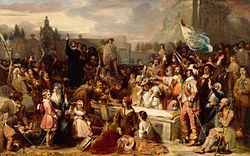
Back حروب الأساقفة Arabic Guerres episcopals Catalan Válka biskupů Czech Rhyfeloedd yr Esgobion CY Bischofskriege German Guerra de los Obispos Spanish Guerres des évêques French Cogaí na nEaspag GA Peperangan Uskup-uskup ID Biskupastríðin IS
| Bishops' Wars | |||||||
|---|---|---|---|---|---|---|---|
| Part of the Wars of the Three Kingdoms | |||||||
 The Signing of the National Covenant in Greyfriars Kirkyard by William Allan, 1838 | |||||||
| |||||||
| Belligerents | |||||||
|
|
| ||||||
| Commanders and leaders | |||||||
| Strength | |||||||
| 20,000–25,000 | 20,000 | ||||||
| Casualties and losses | |||||||
| 300–400 | 300–600 | ||||||
The Bishops' Wars[b] were two separate conflicts fought in 1639 and 1640 between Scotland and England, with Scottish Royalists allied to England. They were the first of the Wars of the Three Kingdoms, which also include the First and Second English Civil Wars, the Irish Confederate Wars, and the 1650 to 1652 Anglo-Scottish War.
In 1637, Charles I, then king of both Scotland and England, imposed changes in religious practice on the Church of Scotland. These were strongly opposed by many Scots who, in 1638, signed a National Covenant and became known as Covenanters. The General Assembly of the Church of Scotland then expelled bishops from the church, turning a religious dispute into a struggle for political supremacy. The new Covenanter government raised an army to prevent Charles using force to restore his authority.
The First Bishops' War began in early 1639, when minor skirmishing between Covenanters and Scottish Royalists took place in north-east Scotland. In June, English and Scottish armies assembled near Berwick-upon-Tweed, but withdrew without fighting, after reaching a treaty. The peace terms included calling a new General Assembly and Scottish Parliament, which Charles hoped would reverse their earlier decisions. Instead, they were re-confirmed, and both sides again made preparations for war. In 1640, in what is now called the Second Bishops' War, the Scots invaded and occupied parts of northern England, after winning a victory at the Battle of Newburn.
Under the interim Treaty of Ripon, the Covenanters continued the occupation pending a final settlement, during which Charles agreed to pay their expenses. This required him to recall the Parliament of England to raise money for this purpose and to ratify the treaty which was finalised in August 1641. Though this ended the Bishops' Wars, political differences between Charles and the new English Parliament escalated to the outbreak of the First English Civil War in August 1642.
Cite error: There are <ref group=lower-alpha> tags or {{efn}} templates on this page, but the references will not show without a {{reflist|group=lower-alpha}} template or {{notelist}} template (see the help page).
- ^ "Cogadh Sìobhalta Shasainn - Ath-shealladh". gd.eferrit.com.